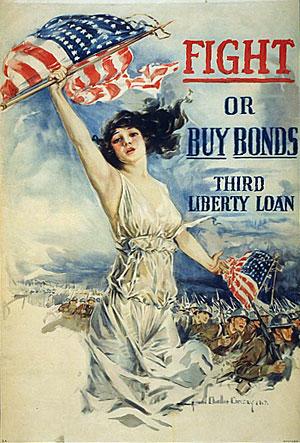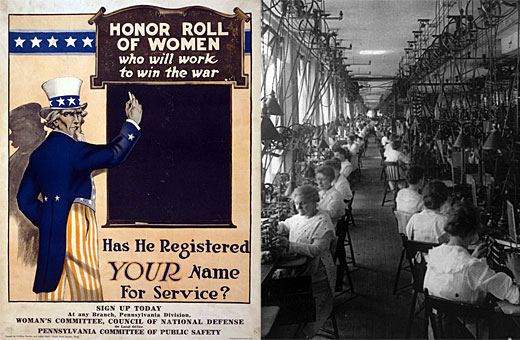After-War Economy in the United States
The war occurred during a time of industrial and urban growth reform. More government regulation and control was welcomed by many reform groups. Organizing and managing the economy for the war was the job of war agencies set up by President Wilson. In order to finance the war, the government sold war bonds that were called Liberty Bonds. Like savings bonds, people bought war bonds that could be redeemed with interest. Taxes were also raised. Patriotism among Americans was high and people wanted to contribute. The federal government raised over 30 million dollars for war efforts.

Liberty Bonds advertisement poster
When white male soldiers went to war, they were replaced by many African Americans who migrated north to factory towns and by women who left traditional roles to do their part for war interests. Manufacturers began to produce goods that supported the war and a War Industries Board was set up to manage the purchase of military supplies. Women and African Americans worked in gun factories and made gas masks.
About 390,000 women joined the work force – many in jobs not specifically related to the war, including letter carriers and telegraph operators. They also made and assembled parts for tanks and airplanes. A War Labor Policies Board set wages and negotiated with labor unions. After the war ended the, National War Labor Board settled labor disputes.
(left) Advertising campaign to get women to work for the war effort
(right) Women at work during the war
During the war, President Wilson managed food and fuel production and distribution under the Lever Food and Fuel Control Act of 1917. Under engineer Herbert Hoover, food prices were monitored and food was rationed in order to control productivity and waste. Daylight Savings Time was also established to save fuel by turning clocks forward one hour to lengthen daytime. Many historians attribute the patriotism among Americans during wartime to the passing of the Eighteenth Amendment, which prohibited the manufacturing or the selling of alcohol. Because grain was needed to make both alcohol and bread for the soldiers overseas, Congressmen found it easy to get public support for the bill.